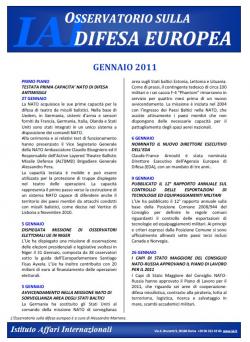Observatory on European defence, May 2001

14 - 15 May 2001
EU Defence Ministers meeting – Relations with partners and exercises
EU Defence Ministers held a meeting with NATO partners and EU admission candidate countries to discuss their involvement in the ESDP decision-making process and crisis management operations.
The major issue was the possibility for the EU to have direct access to a pre-defined set of NATO capabilities, given the persistent Turkish opposition to a permanent arrangement.
The Swedish Presidency of the Union once again underlined the importance of non-military means of crisis management and the need for civil/military coordination when the use of force is required.
The crisis management system still under development will be tested in a number of exercises, as will the working of the cooperation arrangements with the Atlantic Alliance. With regard to combined operations, NATO Officers have proposed adopting the Alliances’ Deputy Supreme Allied Commander Europe (D-SACEUR) as the cornerstone of EU-NATO relations.
15 May 2001
WEAG – Cooperation program
WEAG Defence Ministers adopted a framework agreement on “European Undertakings for Research Organisation Programmes and Activities”, named EUROPA.
The program aims at improving the coordination between member countries’ initiatives on defence research and technologies.
All EU and NATO members are taking part in the initiative, with the exception of Ireland and Iceland, respectively.
23 May 2001
Meeting EU Military Committee
EU Chiefs of Staff held their first formal meeting in Brussels.
The Military Committee proceeded with some preliminary work on the capability conference to be held in November: military capability shortages were identified, to facilitate the process of reform by European armed forces in view of the conference.
29-30 May 2001
NATO Meetings – NAC-EU General Affairs Council Meeting
The Atlantic Alliance Meeting in Budapest widely discussed the problem of coordinating the European security institutions. On this occasion, the first formal meeting between EU and NATO foreign ministers was held.
The Turkish government still opposes EU proposal, recalling the arrangements already in place between NATO and the WEU. The European Union’s requests, on the other hand, seem to have a wider scope, granting a higher level of autonomy.
A permanent arrangement between the two institutions is still to be defined, while there has been some progress, as in the case of relations with Canada.
The governments are still worried by the shortages in real operational capabilities.
-
Details
Roma, Istituto affari internazionali, 2001 -
Issue
01/05


